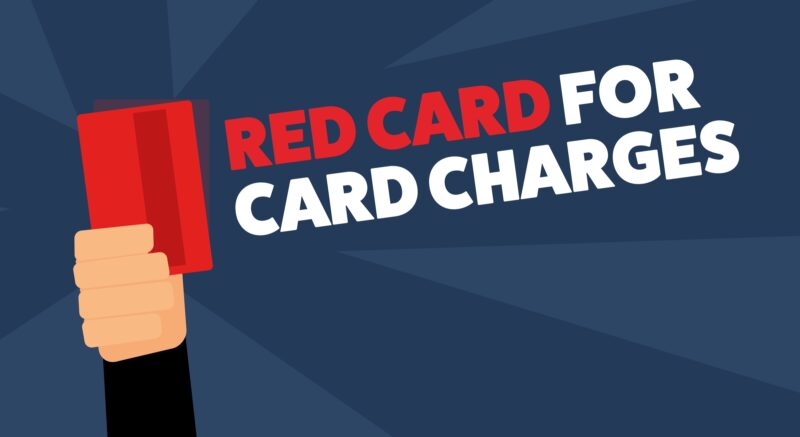21 March 2017
Charges for paying by card to end next year - but not for Amex

Like many people, I’ve always hated being charged for paying by card. Whether it’s at the newsagents or on an airline’s website – why do companies think it’s ok to charge me for taking my money? Yes there are business bank charges for accepting card payments. But there are also charges for safely moving a business’s cash around. It’s never free to process the money that comes through your tills – but it’s a cost that all customer-facing businesses need to bear.
I’ve spent much of the past few years campaigning to get card charges outlawed. And the battle is almost won. Over the last few months, airlines such as Monarch and Virgin Atlantic have responded to our campaign – scrapping card charges altogether.
And next year, new rules will come into force which will finally ban all companies from charging customers to pay by card.
American Express - that'll do nicely
That should have been the end of the problem. But a wrinkle in the rules looks set to allow businesses to continue charging customers if they pay by American Express – or if they use a corporate credit card.
As you might imagine, American Express are not too thrilled about this. If companies are allowed to continue charging for people who pay by Amex, many airlines and travel companies will surely do just that. And while we rarely see card charges on the high street, it’s not impossible that in time even restaurants and shops will start adding a surcharge for customers who pay by Amex.
This can’t be good news for competition in the credit card market. As things stand, Amex is one of the leading players for credit card rewards – offering a number of different cash back and airmile schemes. But if people feel like they’re going to be charged every time they take their Amex out of their wallet, they’re likely to opt for a different card. And without the volume of transactions, Amex’s rewards will only deteriorate.
It is true that Amex tends to charge retailers more than they would get charged if their customer used a Mastercard or Visa. And I’m all in favour of competition being applied to Amex to bring down its charges. But in this new world, even if it whittles its charges back to the same level as Visa and Mastercard, it will still run the risk of businesses passing these charges directly onto their customers. It just doesn’t feel like a level playing field.
Who are the enforcers?
There’s another problem here too. While there are already rules in place to stop companies charging people any more than it costs them for accepting a card payment, there doesn’t seem to be anyone enforcing these rules. As things stand, companies like Flybe and Ryanair charge 3% and 2% respectively for paying by credit card – while the cost to them is actually something more like 0.6%. The existing rules already say that they shouldn’t be charging so much – but no one seems willing to stand up to them.
Although they will legally have to scrap their fees for Visa and Mastercard payments next year, there’s every chance they’ll continue to hit customers with a very high charge for paying by Amex. If it costs them 1% to accept an Amex payment, for example, don’t be surprised if some airlines are charging 2% or 3%.
Time for businesses to stand up to their banks
One final thing to say is that if you’re a small business that is worried about the new card surcharging ban coming into place – now is the time to start shopping around for a new bank.
Since I started running a campaign to get rid of excessive card charges, I’ve had more than a handful of emails from angry travel agents who tell me that they are being unfairly villainised by their customers for charging to pay by credit card. While it may only cost Ryanair 0.6% to accept credit card payments, these smaller businesses really are being charged up to 2.5% by their banks – so they are within their rights to pass these onto their customers
I don’t doubt this is true. But all businesses should have seen their costs for accepting card payments come down over the past year – and if they haven’t, they need to challenge their bank – or, better still, vote with their feet and find a better deal elsewhere.
I don’t think that customers should be charged for paying by card, but I also don’t think it’s fair that small businesses are ripped off for accepting card payments. Yet until small businesses get in the habit of regularly shopping around for their banking services, there won’t be any competitive pressure on banks to charge fairly. And in the end, it is all of us who lose out if retailers get a bad deal from their bank – as it merely ends up getting added into the headline prices of the products they are selling.
The government can still stop this
There’s still time for the UK government to clear some of this mess up. Earlier this week, the Treasury closed its consultation on how the card surcharge rules are implemented in Britain – and we now await the decision. It is within their gift to implement an outright ban – including Amex and corporate cards. And while they’re at it, they should look at introducing some measures to ensure that banks can’t continue overcharging small businesses.
Here’s hoping for common sense – but don’t hold your breath.


